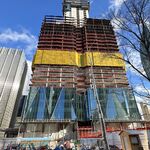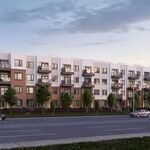Wow - all this doom and gloom here! I'm actually still a student and the general trend that almost my entire generation displays is a hate for the suburbs and a love for downtown(s). I'm not talking about just downtown Toronto - I'm talking about quaint, urban areas that are liveable, walkable, and breathable. This entire generation has grown up in the suburbs - in stark contrast to their parents who hail from the much denser cities, the quieter suburbs of yesterday, the farms, etc. The suburbs nowadays aren't the suburbs they used to be - they are a meaner, scarier place. Just looking at my hometown of Mississauga, you can see that it has grown unsustainably at a rapid pace. The 3 or 4 lane arterials are clogged with cars, driving home from work is now a nightmare. Even my parents (dedicated suburbanites) are starting to complain at the frenzied pace of the suburbs. There is absolutely nothing about the outer areas of the GTA that is attractive anymore. Have a drive down the northern stretch of Mavis near Heartland in Mississauga during rush hour one day. You have to be crazy to live/shop/work there. Before, suburbs used to be a break from the hustle and bustle of downtown and an opportunity to experience a bit of nature. Now, they are neither quieter than downtown (in fact, I'd argue that they are busier in terms of car traffic and pollution), nor can they be compared with anything natural. You get neither the convenience of urban areas or the experience of the country life.
I think people will gravitate towards downtown(s) such as Toronto, Mississauga City Centre, etc.; however a few things will have to occur for these downtown areas to remain so desirable.
1) Gas prices will have to remain high, and no viable, cheap electric car will have to be produced.
2) Efficient, reliable public transit will have to be built i.e. the return of Transit City (of which there is some faint hope) and the DRL (which the province seems to be seriously considering!)
3) Downtown's amenities (shopping, entertainment, parks, etc.) will have to continuously expand and remain attractive.
4) Toronto will have to be the centre of employment in the GTHA.
5) A new mayor will HAVE to be elected after Ford's term ends.
There are so many great things happening right now in Toronto, even with the current regime, that I'm quite surprised at the negativity here! Everyone here mentions that public transit will only get worse. Last time I checked, the Eglinton LRT is under contruction, GO service is improving, TTC ridership increasing, and the ARL is under contruction. Just have a glance at Christopher Hume's analysis in today's Star. Toronto, folks, will only become bigger and better! Let's be optimistic about the future. The posters here (theoretically fans of urbanism) should know better and be proud of the city they live in.




